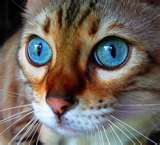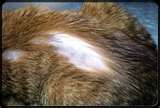Alopecia in Cats
Is one of the most feared conditions any cat lover will face
Alopecia in cats is a condition that most all cat lovers fear and dread.
It can also be an extremely painful ordeal for your best friend, and several experts will tell you that there is no sure cure for this condition that is causing your cats hair to fall out.
 Alopecia means your cats hair is falling out
Alopecia means your cats hair is falling outWhen your cat has chronic forms off skin problems where their hair is virtually falling out or has bald patches something is terribly wrong.
Rashes, extremely dull coats or even dandruff is also a warning sign and in most all cases this is caused by the diet and something they are lacking.
And despite what most experts tell you, there is some help for these conditions.
Alopecia in your feline can cause a partial or a complete hair loss, it can appear as a pattern, or it can be varied with no pattern.
It can also be symmetrical, or it may be totally random; but it will most always be a guessing game as to the actual cause of the condition.
In older cats with serious diseases like cancer, alopecia is very common,
However in all other cases that can affect kittens and cats of all ages and breeds and there are numerous causes and possibilities for this condition.
There is also a form of this condition referred to as psychogenic alopecia that is self-caused by excessive grooming by your cat.
SEVERAL POTENTIAL CAUSES
Alopecia in cats by definition simply means that your pets hair is falling out, so let’s examine some of the most common reasons why this could be happening to you cat.
Allergic Reactions or Dermatitis
This is caused by something irritating your cat’s skin.
In this situation your cat may have an allergic reaction to an antibiotic, some type of metal exposure, plastic exposure, or chemicals such as carpet cleaners or even deodorizers.
With this condition your cat will develop reddish skin and or blisters, and they will naturally scratch themselves. If chronic, it will result in hair loss.
Alopecia Areata
 Is an immune disorder the cause?
Is an immune disorder the cause?This is a condition that is believed to be an immune disorder in cats, and with this disorder, your cat will loss patches of hair generally on the head, neck and body.
However they will experience no itching symptoms at all which makes it very troubling to diagnosis.
Atopy: a form of dermatitis
This is an allergic reaction to something you pet has inhaled and it could be pollen in peak pollination periods, or it could be dust mites or even mold.
With this condition, your pet will generally start to lick their feet, their ears may become inflamed, and hair loss will be mild to moderate.
they may also develop hot spots that could be severe and because it is a form of dermatitis, could become infected.
Cheyletiella mange
This is caused by infestation by an ear mite and will cause your cat to itch almost immediately and this will lead to development of scales and if severe enough, a severe hair loss.
Facial alopecia
This is a condition where hair loss occurs both around and above the eyes, and is quite normal and will start developing in cats between the ages of one and two years.
It is a condition where the density of hair is just thinning and happens most frequently to short haired cats with darker hair.
LESS FREQUENT CAUSES OF ALOPECIA IN CATS
It is not serious unless redness or scaling sets in, which could than cause the thinning to spread, resulting in hair loss.
Flea Dermatitis
This is a condition where your cat is having a reaction from the infected saliva from fleas. \
It will cause an intense itching on the part of your cat which in turn will lead first to red sores, than papules or scales, and then a moderate to heavy hair loss.
With hot spots that become very inflamed, infection may set in as will hair loss.
Food Allergies
This form of alopecia in cats is just that, an allergic reaction to something in your pet’s diet and is generally something new, but not always.
This form will also start with your cat licking their feet and then the itching starts, and if moderate to severe, hair loss occurs.
Alopecia during Pregnancy
This is simply a reaction to stress, and can also occur with a serious illness or in some cats, just a stressful situation.
With this form of alopecia in cats your pet’s hair loss will be very sudden and in most cases, widespread.
Hyperthyroidism
This alopecia condition affects over 40% of all cats as hair follicles are weakened and as a result simple scratching will cause hair loss.
Over grooming by your pet will cause hot spots that may have a complete loss of hair.
Psychogenic alopecia
A condition where your cat just simply over grooms itself and is caused by boredom, anxiety, or stress.
This is especially dangerous as it can lead to ulcers developing where there has been excessive hair loss, especially in the groin areas and along your pets back.
Ringworm alopecia
This form of alopecia in cats is caused by some type of a fungi infection and will cause only minor itching in your pet, but because of the infection, the hair loss can be severe.
TREATMENTS THAT CAN HELP
Also associated with this condition may be several crusty and scaling areas on your pet’s skin where hair loss has occurred.
There are several other conditions or diseases that may cause alopecia in cats, such as sweat gland cysts, Cushing disease, and lice infections just to name a few.
Treatment for alopecia in cats will range from various medications and tropical medications, but the options are very limited and most will not work effectively.
However, what does work in most all cases is dietary changes and adjustments, as well as supplements.
Most all forms of alopecia are caused by your pet’s diet, or what is lacking in it.
Try changing their diet to a preservative free diet and supplement your pet with Vitamins A, C, E, as well as the mineral zinc.
Most all skin diseases are caused by deficiencies of these vitamins and zinc.
Most all types of mange conditions respond to and are corrected very quickly by Vitamin C supplements, and most all rashes, eczema, and hair loss recovers very quickly with Vitamin E supplements.
Abscesses and sores respond rapidly to zinc, and Vitamin A helps any type of bacterial infection, skin eruption, or cysts.
Summary
Hair loss in your cat at some point will occur, but as with any condition, improving their immune system by supplementing can save your feline friend a lot of unnecessary pain.
Nutrients for Alopecia in Cats
Cat Vitamin Store
Rippling Skin Disease in Cats








